Every June, communities the world over celebrate Pride Month, a time to spotlight LGBTQ culture, history, acceptance, love and allyship.
This June, Hoosiers are also celebrating ten years of marriage equality in the state of Indiana.
A part of that story is our own Rob MacPherson Stolen, Vice President of Development & Strategy with the Indianapolis Foundation, a Central Indiana Community Foundation affiliate.
He and his husband were one of five couples who joined onto Baskin v. Bogan, a case filed by the ACLU in March of 2014 to secure marriage rights for same-sex couples in Indiana.
Rob and Steven had privately recognized their commitment to one another long before 2014. After meeting and starting a long-distance relationship earlier in the 1980s, Steven left a teaching gig at Simpson College in Iowa and moved to Indianapolis to be with Rob in 1988.
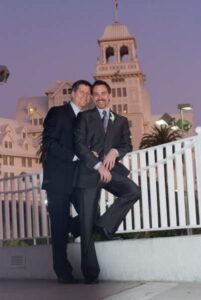
“This is our ‘wedding photo’ taken 10/11/2008 at Claremont Hotel in Berkeley, CA”
“October 11th of 1987 is the anniversary we’ve always celebrated,” Rob says now.
In 2008, the two were officially and legally married on that date in California during a brief window of legality that year prior to the passage of Proposition 8. (Prop 8 would be overturned several years later). However, their marriage was still not recognized nationally or in the state of Indiana.
But in early 2014, Rob received a call from an acquaintance at the ACLU proposing he and Steven be part of the effort to bring marriage equality to the Hoosier state.
“We said ‘Heck yeah.’”
Rob remembers the time surrounding the case as mostly joyous: “We received so much support from our community. We were just welcomed everywhere. It was a wonderful six-month journey, and we made life-long friends with the other plaintiffs through it all.”
Along with Rob and Steven, their teenage daughter Abbey would file a separate suit as a minor. In reality, each member of their household was missing out on over a thousand federal laws that benefit married couples and their children—that’s before counting state and local laws.
Finally, on June 25th, 2014, U.S. District Judge Richard L. Young issued his decision, and same sex marriage was legal in Indiana.
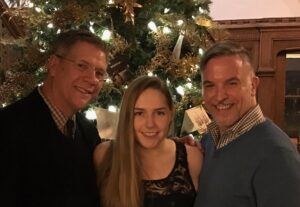
Steven, Abbey and Rob
“Couples flooded the City-County Building,” Rob says of the aftermath. “Beth White [then-Marion County Clerk] kept the offices open late to accommodate a line of couples stretching out the doors and across the street.” Rob laughs. “A lot of people in the city have June 25th and 26th as their anniversary because of that.”
Two days later, an appeal by the state would temporarily halt the decision, putting the ban back in effect until October. But when the Supreme Court ultimately declined to hear the appeal, the lower court’s decision carried the day.
“Pardon the pun, but it’s a real point of pride,” Rob says. “Indiana got same-sex marriage a year before the nation.”
Ten years on, though, Rob has no illusions about the state of LGBTQ acceptance, especially in America’s discourse.
“In some ways, it’s worse now than it was ten or even fifteen years ago,” he says. “For some reason, it’s more exposed. Violent and irresponsible rhetoric is more prominent now. I’m especially worried for my trans brothers and sisters. It scares the hell out of me.”
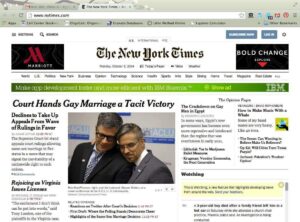
“Our picture was on the cover of the New York Times on-line edition on 10/6/2014 when the appeals court ordered for marriage equality in Indiana”
Are there groups that give him optimism?
“IYG,” he says, referring to the organization previously known as the Indiana Youth Group.
A regular grantee of the Indianapolis Foundation and others in the CICF collaborative, IYG was established in 1987 and serves young people ages 12 to 24 who identify as LGBTQ.
Over the decades, IYG has played a central role in the growing acceptance of queer youth and young adults in Indiana. That change may be most apparent in the growing visibility of Pride month itself.
While there had been Pride celebrations in Indianapolis since at least 1981, they were often hidden and informal. Rob brought up the 1989 edition which took place beneath the bleachers of the Indianapolis Tennis Center on what was then IUPUI’s campus.
“You had to follow taped arrows on the sidewalk to get to a small reception area with a bar. There were no signs.”
Since that time, though, Pride has become a mainstay on the city’s calendar, culminating in a parade and music festival attended by an estimated crowd of over 100,000 people annually.
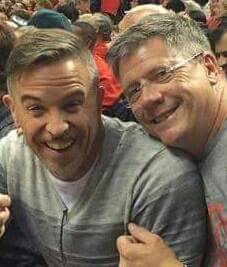
“A fun picture of us!”
Today, when asked how it feels to be part of history, Rob echoes his daughter Abbey who, throughout the 2014 case, repeated the phrase “it should be no big deal” like a mantra to maintain perspective.
“We really had no aspirations to be out front at protests,” Rob says. “Our protest was living openly and authentically, and raising a kid in a loving home in a community we enjoy. We wanted people to see how similar we all were. But to be the same under law, we had to go to court.”
CICF and our affiliates take inspiration from Rob and Steven’s family story.
If you are looking to support causes that boost the LGBTQ community in Central Indiana, talk to us about ways to amplify your giving through CICF’s collaborative network.





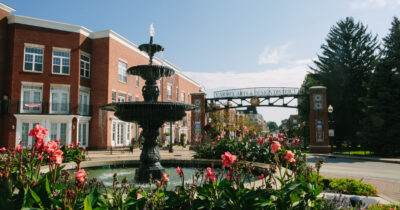
Leave A Comment